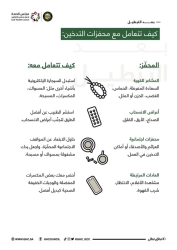Introduction
 His Majesty Sultan Haitham bin Tarik, Sultan of Oman appointed a Supreme Committee in response to the COVID-19 pandemic. The Committee is tasked with tackling developments resulting from COVID-19 and ensuring preventive measures are in place to curb the pandemic. The Committee is headed by His Excellency the Minister of Interior and is formed from officials representing key ministries and government entities. The Head of the National Tobacco Control committee and Undersecretary of the Ministry of Health is a member of the Supreme Committee. The Ministry of Health is focusing on two main areas in tobacco control: enforcing a ban on waterpipe use in public places, and recognizing World No Tobacco Day 2020 and linking its activities to COVID-19.
His Majesty Sultan Haitham bin Tarik, Sultan of Oman appointed a Supreme Committee in response to the COVID-19 pandemic. The Committee is tasked with tackling developments resulting from COVID-19 and ensuring preventive measures are in place to curb the pandemic. The Committee is headed by His Excellency the Minister of Interior and is formed from officials representing key ministries and government entities. The Head of the National Tobacco Control committee and Undersecretary of the Ministry of Health is a member of the Supreme Committee. The Ministry of Health is focusing on two main areas in tobacco control: enforcing a ban on waterpipe use in public places, and recognizing World No Tobacco Day 2020 and linking its activities to COVID-19.
Ban on waterpipes in public places
The Supreme Committee, on 12 March 2020, issued a ban on use of waterpipes in all licensed outlets effective as of 15 March 2020 for the period of one month. Oman’s Ministry of Health has been in close contact with the three different Omani municipalities, which in their turn took forward this ban across Oman and successfully implemented it. The municipalities issued their orders to ban waterpipes and communicated this widely using their social media platforms especially through Facebook and Twitter. Dr. Jawad Al-Lawati, Senior Consultant and Rapporteur for the National Tobacco Control Committee at the Ministry of Health stated: “When there is a political will, implementation is quite easy, this is the case with the waterpipe ban during the outbreak of COVID-19”. The ban is still in place because restaurants and cafes are still closed to date and mass gatherings are disallowed.
Recognition of World No Tobacco Day and linking its activities to COVID-19
To coincide with World No Tobacco Day 2020, the Department of Health Promotion and Health Education at the Ministry of Health developed a number of video clips linking tobacco use to the transmission of the virus that causes COVID-19. The videos were aired at peak times during news breaks. Key television programmes hosted physicians to talk about the topic. Dr. Ahmed Al-Wahaibi, a consultant and healthcare physician, was hosted on national radio and the main TV channel to talk about the risks of tobacco use and COVID-19. Oman’s Ministry of Health used its social media platforms especially Facebook and Twitter, in cooperation with the World Health Organization (WHO), to disseminate many health awareness and tobacco control messages.
Way forward
The Supreme Committee is continuing to monitor the COVID-19 situation and will move forward accordingly. The Committee is preparing a plan to return to normal activities and there has been some consultation with WHO.
The Ministry of Health has already conducted a study—published in June—to identify the clinical characteristics and outcomes of hospitalized patients with COVID-19 in Oman. Within this study the link between tobacco use and the transmission of the virus that causes COVID-19 has been explored on a sample of 63 patients and there is a view to explore this further in the future.
Related links
Ban on all licensed shisha outlets from Sunday (Oman Daily Observer)
Oman’s Ministry of Health e-portal
Oman’s Ministry of Health (Twitter)
Residents in Oman welcome temporary ban on new shIsha cafes (The Arabian Stories)




